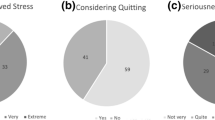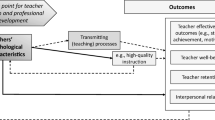Abstract
The professional activities that constitute the work of school teachers are known to be both numerous and varied. While managing teacher workloads is a major priority for governments around the world, valid and reliable figures are difficult to obtain. From a larger qualitative study of teachers’ work culture in Singapore, we report data obtained from six teachers through work-shadowing methods. The latter we argue overcomes weaknesses in existing research using pre-determined survey categories. Our results showed that the professional work of these teachers were as varied (although variable across the year) as their counterparts elsewhere and that the total time spent on work activities ranged from 45 to 65 h per week. While this upper limit seemed slightly higher than that from other locations in the developed world such as the UK, the findings based on our sample do not support the claim that teachers in Singapore—a highly achieving system—devote considerably more time than school teachers elsewhere.
Similar content being viewed by others
References
Butt, G., & Lance, A. (2005). Secondary teacher workload and job satisfaction: Do successful strategies for change exist? Educational Management Administration and Leadership, 33, 401–422.
Czarniawska, B. (2007). Shadowing and other techniques for doing fieldwork in modern societies. Koege, Denmark: Copenhagen Business School Press.
Emerson, M. R., Fretz, I. R., & Shaw, L. L. (1995). Writing ethnographic fieldnotes. Chicago: University of Chicago Press.
Forsythe, D. E. (1999). “It’s just a matter of common sense”: Ethnography as invisible work. Computer Supported Cooperative Work, 8, 127–145.
Galton, M., & MacBeath, J. (2010). Balancing the workload equation in English primary schools: A continuing story? Asia-Pacific Journal of Teacher Education, 38, 301–315.
Garfinkel, H. (2002). Ethnomethodology’s program: Working out Durkheim’s aphorism. Lantham, MD: Rowman and Littlefield.
Gershuny, J., & Sullivan, O. (1998). The sociological uses of time-use diary analysis. European Sociological Review, 14, 69–85.
Hargreaves, A. (1994). Changing teachers, changing times: Teacher’ work and culture in the postmodern age. London: Cassell.
IAT [It’s about time!]. (2004). A report on the impact of workload of teachers and students. Newfoundland, CA: Memorial University of Newfoundland.
Jett, Q. R., & George, J. M. (2003). Work interrupted: A closer look at the role of interruptions in organizational life. Academy of Management Review, 28, 494–507.
Lee, Y.-J., & Roth, W.-M. (2006). Learning about workplace learning and expertise from Jack: A discourse analytic study. Journal of Workplace Learning, 18, 205–219.
Liew, W. M. (2005). Teachers’ professional lives in an age of educational reform. In J. Tan & P. T. Ng (Eds.), Shaping Singapore’s future: Thinking schools, learning nation (pp. 137–166). Singapore: Prentice Hall.
MacDonald, R. J., Wiebe, S., Goslin, K., Doiron, R., & MacDonald, C. (2010). The workload and worklife of Prince Edward Island teachers. Charlottetown, PEI: PEI Teachers’ Federation.
McDonald, S. (2005). Studying actions in context: A qualitative shadowing method for organizational research. Qualitative Research, 5, 455–473.
Menlo, A., & Poppleton, P. (Eds.). (1999). The meanings of teaching: An international study of secondary teachers’ work lives. Westport, CT: Bergin and Garvey.
Ministry of Education. (2010). MOE is committed to teachers’ well-being. Retrieved Sept 6, 2013. http://www.moe.gov.sg/media/forum/2010/05/moe-is-committed-to-teachers-well-being.php.
Ministry of Education. (2012). Education statistics digest 2012. Singapore: Planning Division, Ministry of Education.
Mourshed, M., Chijioke, C., & Barber, M. (2010). How the world’s most improved school systems keep getting better. United States: McKinsey and Company.
OECD. (2012). Education at a glance 2012. Retrieved Jan 30, 2013. http://www.oecd-ilibrary.org/education/education-at-a-glance-2012_eag_highlights-2012-en.
OECD [Organisation for Economic Co-operation and Development]. (2011). Retrieved Dec 30, 2013. http://www.oecd.org/education/skills-beyond-school/48631419.pdf.
PWC [PriceWaterhouseCoopers]. (2001). Teacher workload study. London: PwC.
Robinson, J. P. (1999). The time-diary method: Structure and uses. In W. E. Pentland, A. S. Harvey, M. P. Lawton, & M. A. McColl (Eds.), Time-use research in the social sciences (pp. 48–90). New York: Kluwer Academic.
Robinson, J. P., Chenu, A., & Alvarez, A. S. (2002). Measuring the complexity of hours at work: The weekly work grid. Monthly Labor Review, 125, 44–54.
STWS [Secondary Teacher Workload Study]. (2005). Report. Retrieved Jan 12, 2011. http://research.acer.edu.au/workforce/2.
TCTW [The Committee on Teachers’ Work]. (2006). Final report. Retrieved Jan 12, 2011. www.legco.gov.hk/yr06-07/english/panels/ed/papers/ed0212cb2-1041-6-e.pdf.
ten Have, P. (2004). Understanding qualitative research and ethnomethodology. London: Sage.
Timms, C., Graham, D., & Cottrell, D. (2007). “I just want to teach” Queensland independent school teachers and their workload. Journal of Educational Administration, 45, 569–586.
TWDS [Teachers’ Workload Diary Survey]. (2010). UK: Department for Education.
Valli, L., & Buese, D. (2007). The changing roles of teachers in an era of high-stakes accountability. American Educational Research Journal, 44, 519–558.
Weiß, S., Schramm, S., Hillert, A., & Kiel, E. (2013). Teachers’ comments on questionnaires—How quantitative research can learn from qualitative research. Retrieved Jan 4, 2014. http://www.qualitative-research.net/index.php/fqs/article/view/1967.
Acknowledgments
We want to acknowledge all the participating teachers who had graciously and willingly shared their professional lives with the research team.
Author information
Authors and Affiliations
Corresponding author
Rights and permissions
About this article
Cite this article
Lee, YJ., Poon, C.L. The professional work of teachers in Singapore: findings from a work-shadowing study. Asia Pacific Educ. Rev. 15, 525–535 (2014). https://doi.org/10.1007/s12564-014-9338-5
Received:
Revised:
Accepted:
Published:
Issue Date:
DOI: https://doi.org/10.1007/s12564-014-9338-5




